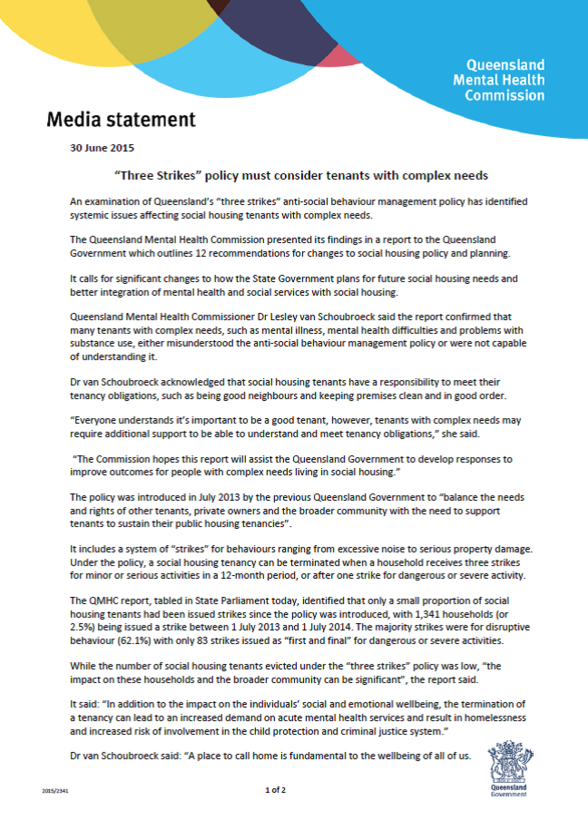An examination of Queensland’s “three strikes” anti-social behaviour management policy has identified systemic issues affecting social housing tenants with complex needs.
The Queensland Mental Health Commission presented its findings in a report to the Queensland Government which outlines 12 recommendations for changes to social housing policy and planning.
It calls for significant changes to how the State Government plans for future social housing needs and better integration of mental health and social services with social housing.
Queensland Mental Health Commissioner Dr Lesley van Schoubroeck said the report confirmed that many tenants with complex needs, such as mental illness, mental health difficulties and problems with substance use, either misunderstood the anti-social behaviour management policy or were not capable of understanding it.
Dr van Schoubroeck acknowledged that social housing tenants have a responsibility to meet their tenancy obligations, such as being good neighbours and keeping premises clean and in good order.
“Everyone understands it’s important to be a good tenant, however, tenants with complex needs may require additional support to be able to understand and meet tenancy obligations,” she said.
“The Commission hopes this report will assist the Queensland Government to develop responses to improve outcomes for people with complex needs living in social housing.”
The policy was introduced in July 2013 by the previous Queensland Government to “balance the needs and rights of other tenants, private owners and the broader community with the need to support tenants to sustain their public housing tenancies”.
It includes a system of “strikes” for behaviours ranging from excessive noise to serious property damage. Under the policy, a social housing tenancy can be terminated when a household receives three strikes for minor or serious activities in a 12-month period, or after one strike for dangerous or severe activity.
The QMHC report, tabled in State Parliament today, identified that only a small proportion of social housing tenants had been issued strikes since the policy was introduced, with 1,341 households (or 2.5%) being issued a strike between 1 July 2013 and 1 July 2014. The majority strikes were for disruptive behaviour (62.1%) with only 83 strikes issued as “first and final” for dangerous or severe activities.
While the number of social housing tenants evicted under the “three strikes” policy was low, “the impact on these households and the broader community can be significant”, the report said.
It said: “In addition to the impact on the individuals’ social and emotional wellbeing, the termination of a tenancy can lead to an increased demand on acute mental health services and result in homelessness and increased risk of involvement in the child protection and criminal justice system.”
Dr van Schoubroeck said: “A place to call home is fundamental to the wellbeing of all of us.
“Social housing has played an increasingly important role in providing stable accommodation for people living with mental illness. It provides an essential foundation for recovery and for people to be well, stay out of hospital, reduce the risk of homelessness and increase their opportunities to participate in the community.”
The QMHC report was based on research by The University of Queensland’s Institute for Social Science Research (ISSR). The Commission also consulted relevant State Government agencies and the Queensland Mental Health and Drug Advisory Council.
The ISSR research included interviews with 12 social housing tenants, of which five were identified as “at risk”. Of these, two have since been evicted, one is in the process of being evicted and the remaining two have received further “strikes”.
Key recommendations included:
- Better planning to meet social housing needs, provision of alternative housing solutions and monitoring outcomes for tenants with complex needs
- Improved communication with tenants about the anti-social behaviour policy and consideration of additional steps to reduce confusion between “strike” and “breach” processes
- Combining enforcement with prevention, early intervention and rehabilitation support
- Adopting a more systemic approach to supporting tenants with complex needs and integrating with other support services.
Download the report here

